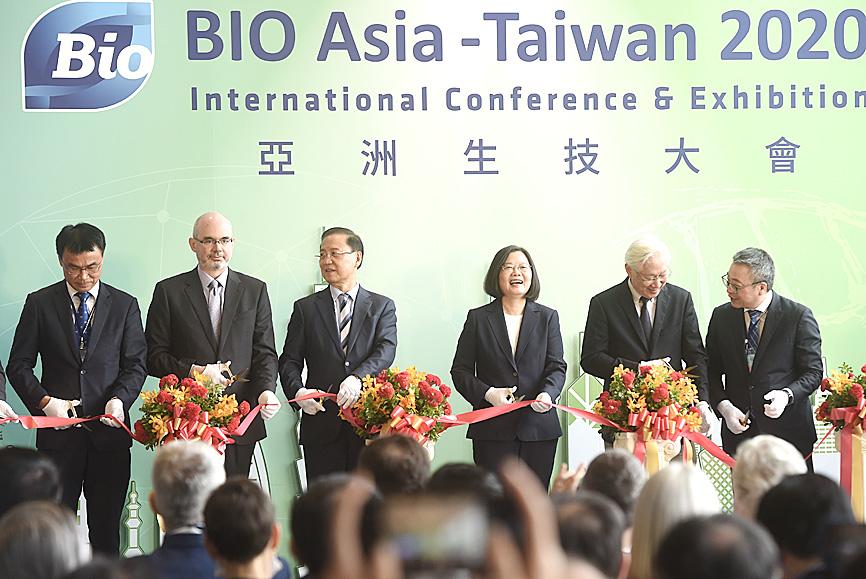During the opening ceremony of the BIO Asia-Taiwan Exhibition yesterday in Taipei, President Tsai Ing-wen (蔡英文) expressed the hope that advancements in Taiwan’s biotechnology industry would usher in major business opportunities from abroad, allowing the sector to reach NT$1 trillion (US$339.50 billion) in annual production.
Despite COVID-19, the annual biotech trade show attracted pharmaceutical and medical device companies from more than 500 nations, including the US, the UK, Australia, Switzerland and Malaysia.
The five-day exhibition is the first in-person international biotechnology trade show in Asia since the outbreak of COVID-19.

Photo: Chien Jung-fong, Taipei Times
Speaking at the opening ceremony, Tsai said that biotechnology is a crucial part of the “five plus two” innovative industries plan that she introduced during her first term, adding that she hopes the exhibition would be a platform for the nation to demonstrate innovativeness and accelerate the development of its biotech sector.
The nation would deregulate relevant laws to expedite the growth of the sector, she said.
The “five plus two” innovative industries plan refers to an initiative to develop an Asian equivalent of the US’ Silicon Valley, including biotech, green energy, industry 4.0, robotics, defense and aviation, as well as innovative agriculture and a circular economy.
Taiwan’s biomedical industry grew by 8.7 percent in annual revenue last year, a record high over the past few years, with the amount of capital invested reaching NT$55.1 billion, Tsai said, adding that digital medicine and precision medicine, two sectors that have shown great potential in recent years, are expected to grow significantly.
Cell therapy, regenerative medicine and genetic testing combined with big data analysis are also areas that have progressed a lot, while innovative medical devices, including nanomedical technology, are expected to receive more attention, she said.
New medicine development has also had breakthroughs, Tsai said, citing a licensing agreement signed in April by Taiwan’s Oneness Biotech Co Ltd and the Denmark-based Leo Pharma, a global leader in medical dermatology.
The agreement was signed to facilitate the development and introduction to the market of FB825, a drug candidate for novel atopic dermatitis and asthma, with an upfront payment to Oneness totaling US$530 million, the highest a Taiwanese company has ever received in such a deal.
Meanwhile, the National Biotechnology Research Park in collaboration with several multi-national pharmaceutical companies, accelerators and venture capital firms yesterday opened an accelerator hub for biomedical start-ups.
Speaking at the inauguration ceremony of the hub, former vice president Chen Chien-jen (陳建仁) said that the new facilities provide one-stop services to cultivate biomedical start-ups and has the potential to become the biggest accelerator hub in the field of biomedicine in the Asia-Pacific region.
The occupancy rate of biomedical companies at the park is 60 percent and the number is expected to reach 80 percent by the end of the year, Chen said, adding that growth at such a rate would be “beyond my imagination.”
Additional reporting by Chien Hui-ju

Chinese spouse and influencer Guan Guan’s (關關) residency permit has been revoked for repeatedly posting pro-China videos that threaten national security, the National Immigration Agency confirmed today. Guan Guan has said many controversial statements in her videos posted to Douyin (抖音), including “the red flag will soon be painted all over Taiwan” and “Taiwan is an inseparable part of China,” and expressing hope for expedited reunification. The agency last year received multiple reports alleging that Guan Guan had advocated for armed reunification. After verifying the reports, the agency last month issued a notice requiring her to appear and explain her actions. Guan

The Kaohsiung Tourism Bureau audited six hotels in an effort to prevent price gouging ahead of Korean band BTS’ concert tour in the city scheduled for Nov. 19, 21 and 22 this year. The bureau on Friday said that the audits — conducted in response to allegations of unfair pricing posted on social media — found no wrongdoing. These establishments included the local branches of Chateau de Chine, Hotel Nikko, My Humble House, and Grand Hai Lai, it said, adding that the Consumer Protection Commission would have penalized price gougers had the accusations been substantiated. The bureau said the Tourism Development Act

GIVE AND TAKE: Blood demand continues to rise each year, while fewer young donors are available due to the nation’s falling birthrate, a doctor said Blood donors can redeem points earned from donations to obtain limited edition Formosan black bear travel mugs, the Kaohsiung Blood Center said yesterday, as it announced a goal of stocking 20,000 units of blood prior to the Lunar New Year. The last month of the lunar year is National Blood Donation Month, when local centers seek to stockpile blood for use during the Lunar New Year holiday. The blood demand in southern Taiwan — including Tainan and Kaohsiung, as well as Chiayi, Pingtung, Penghu and Taitung counties — is about 2,000 units per day, the center said. The donation campaign aims to boost

BACK TO WINTER: A strong continental cold air mass would move south on Tuesday next week, bringing colder temperatures to northern and central Taiwan A tropical depression east of the Philippines could soon be upgraded to be the first tropical storm of this year, the Central Weather Administration (CWA) said yesterday, adding that the next cold air mass is forecast to arrive on Monday next week. CWA forecaster Cheng Jie-ren (鄭傑仁) said the first tropical depression of this year is over waters east of the Philippines, about 1,867km southeast of Oluanpi (鵝鑾鼻), and could strengthen into Tropical Storm Nokaen by early today. The system is moving slowly from northwest to north, and is expected to remain east of the Philippines with little chance of affecting Taiwan,